Google Ads (Firebase & Google Analytics)
This guide describes how to add and configure Firebase and Google Analytics integration.
What is it used for?
Apphud sends subscription events as well as non-renewing events via Google Analytics 4 Measurement Protocol.
- Export conversion events to Google Ads.
- Product Analysis in Google Analytics.
Limitations
- Due to limitation in the Google Analytics 4 Measurement Protocol API events will not show up in Firebase A/B testing results.
- Since it is not possible to disable automatic in-app purchase tracking from Firebase SDK, you may see increased LTV value for your customers in Google Analytics.
Requirements
- Apphud iOS SDK 2.2.0 or higher.
- Apphud Android SDK 1.2.0 or higher.
- Some code is required to properly match users sent from Firebase SDK and Apphud, see instructions below.
How to Add Integration?
Step 1
- Integrate Apphud SDK.
- Integrate Firebase.
- Match Users between Firebase and Apphud and pass instance ID to Apphud.
Step 2
- Open Google Analytics and go to Admin settings of your project.
- Go to Data Streams and open your App's Stream details page.
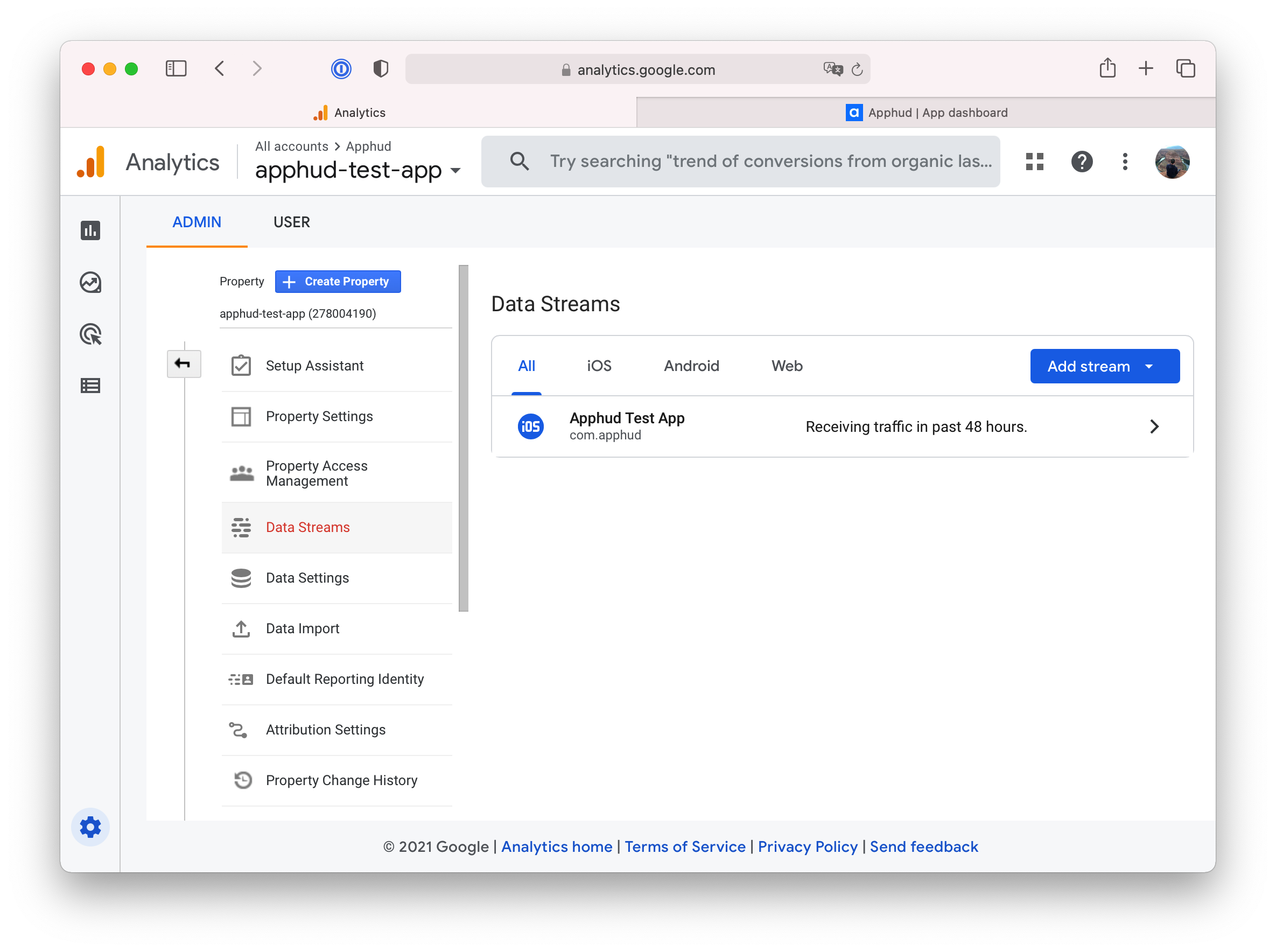
Step 3
At App stream details page find and copy Firebase App ID field.
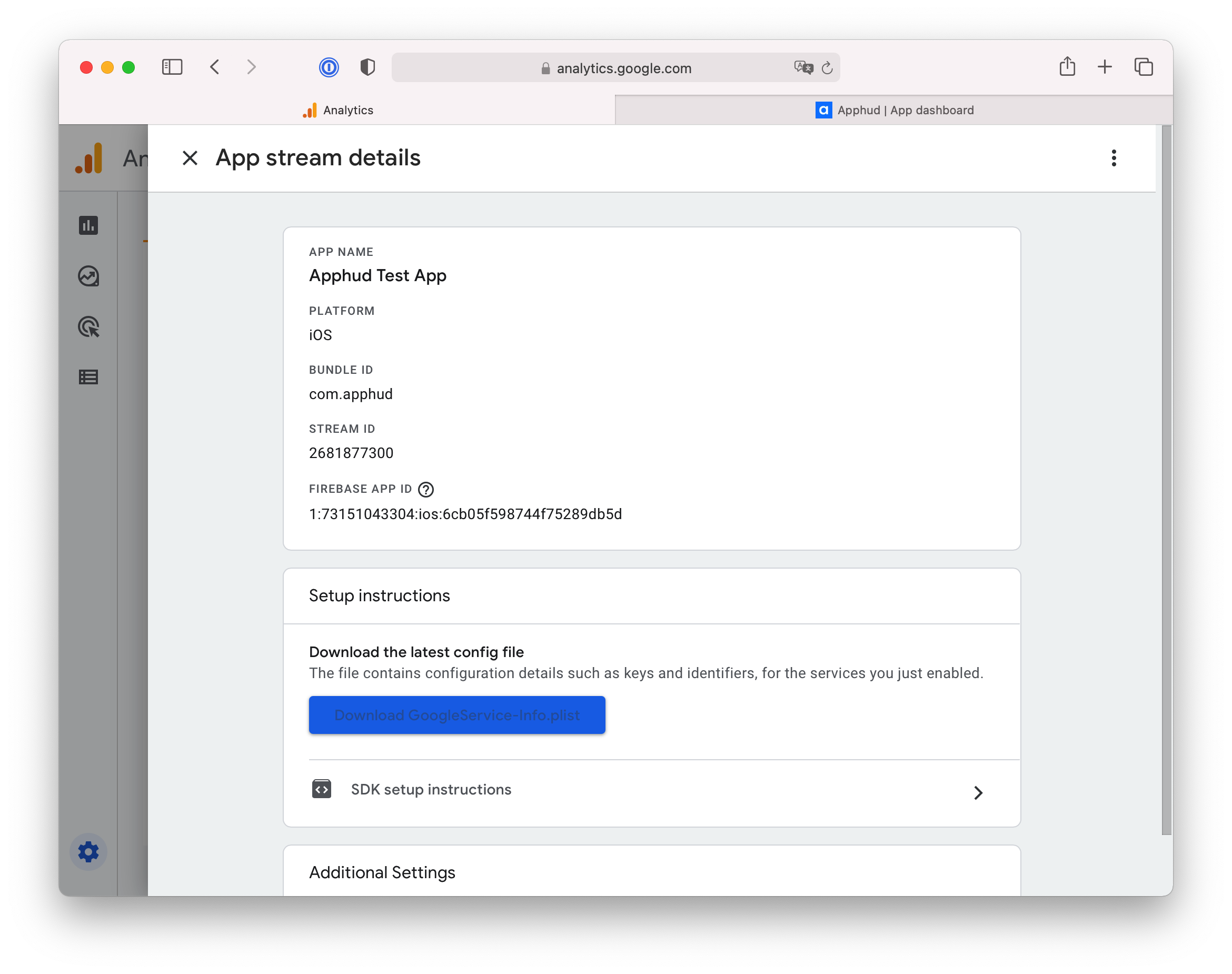
Step 4
Under Additional settings go to Measurement Protocol API secrets page and create a new API Secret if it doesn't exist. Copy the value.
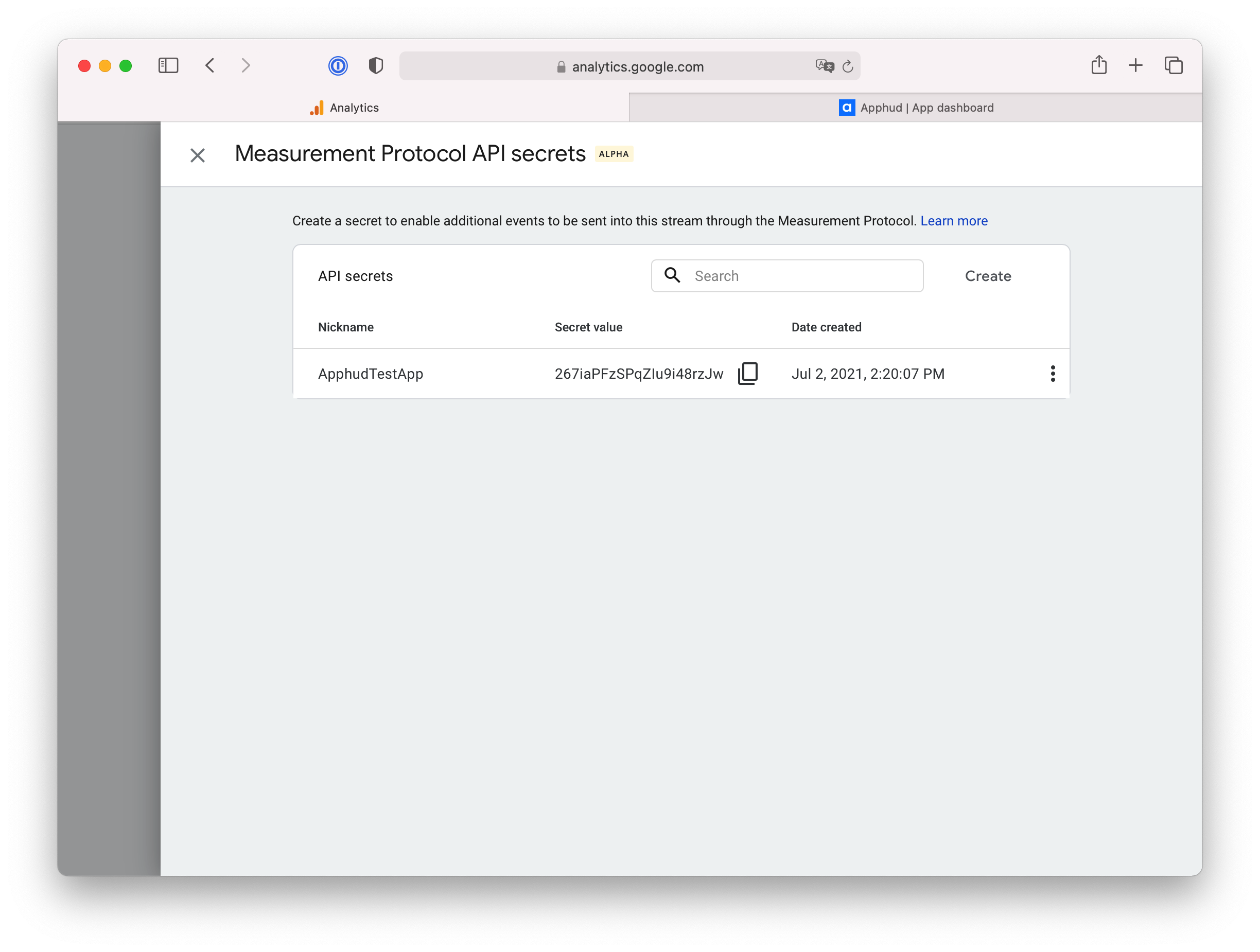
Step 5
At Apphud go to "Integrations" section and add Firebase:
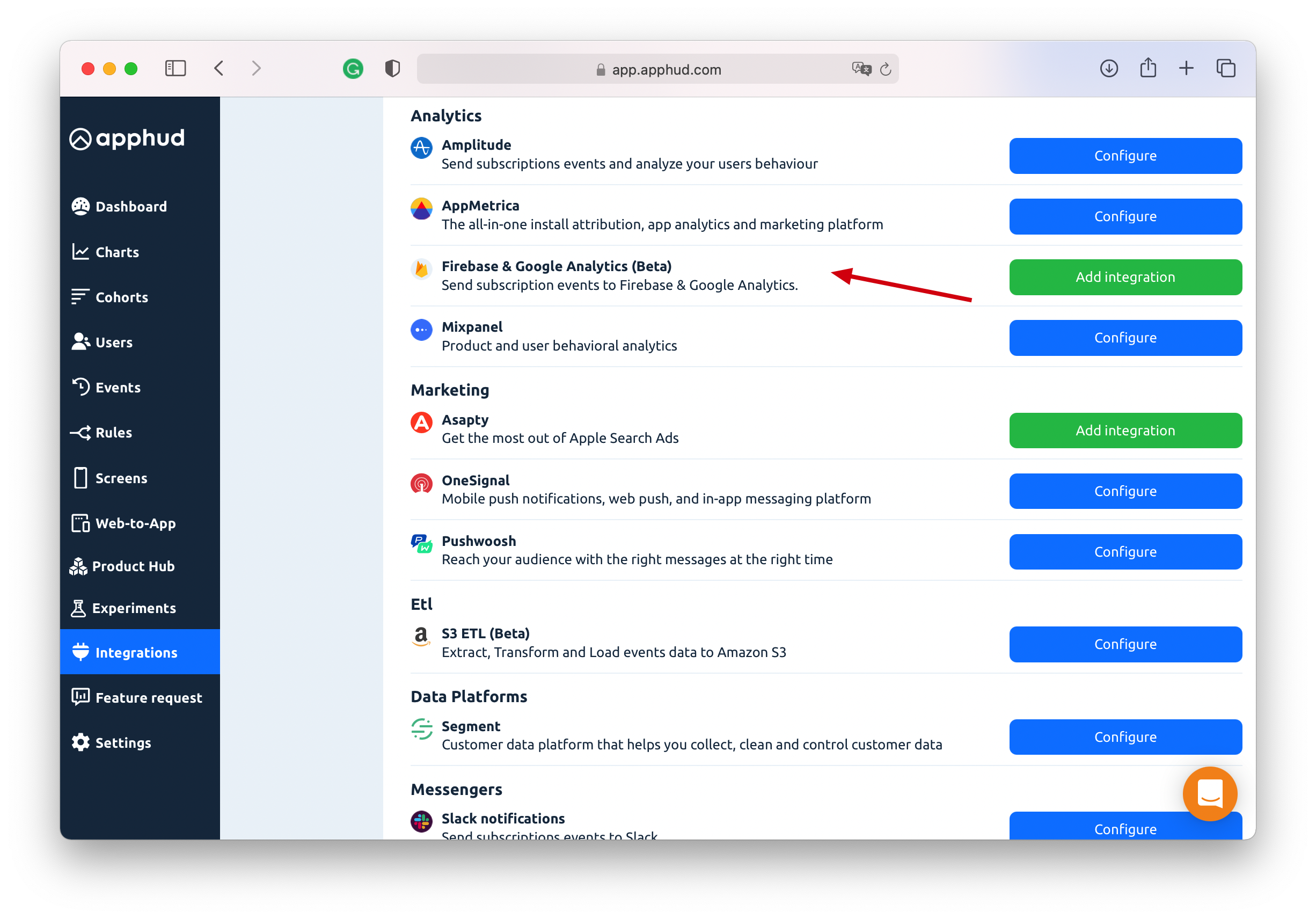
Step 6
- Paste Firebase App ID.
- Paste Client API Secret.
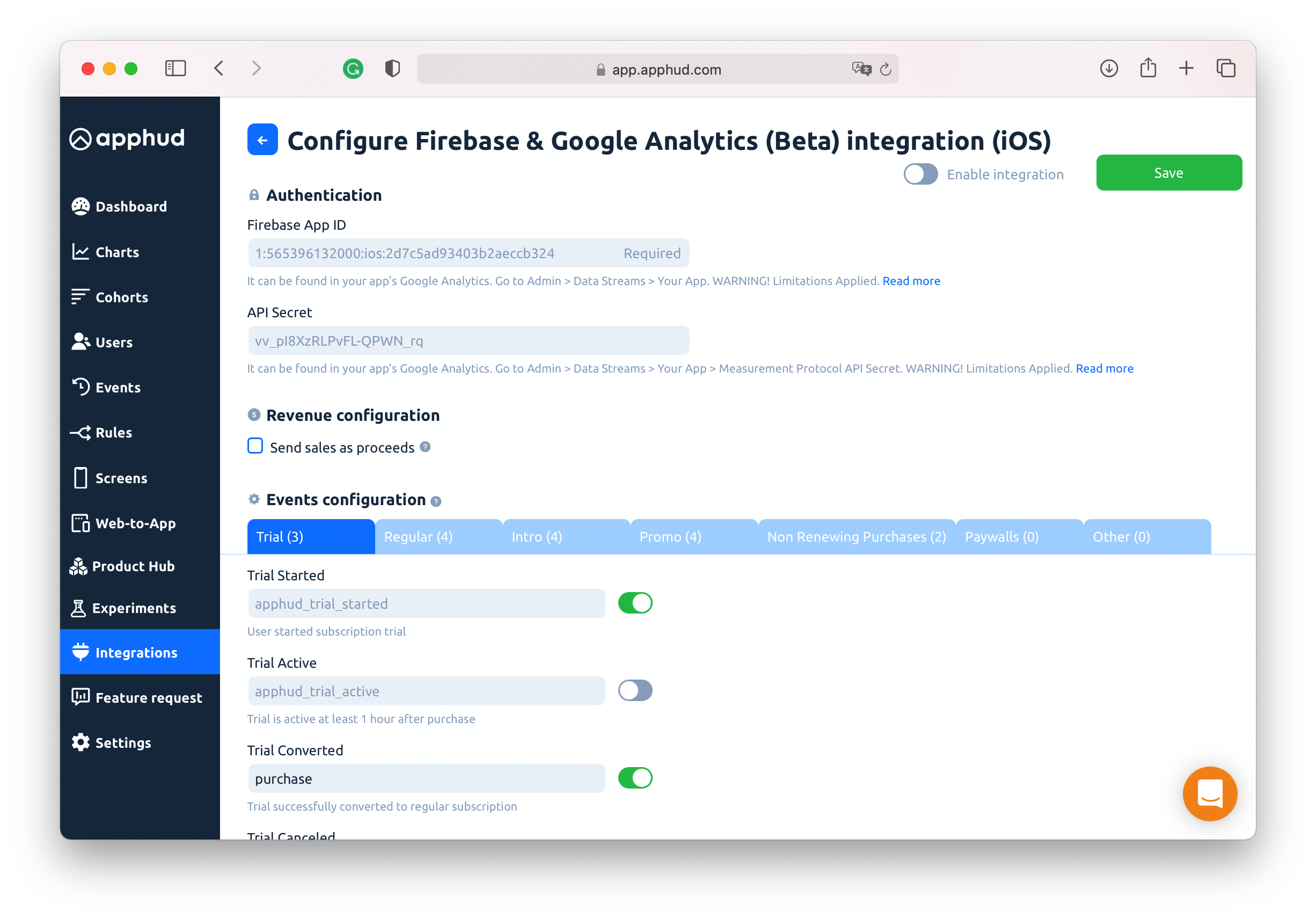
Step 7
You can enable or disable each particular event:
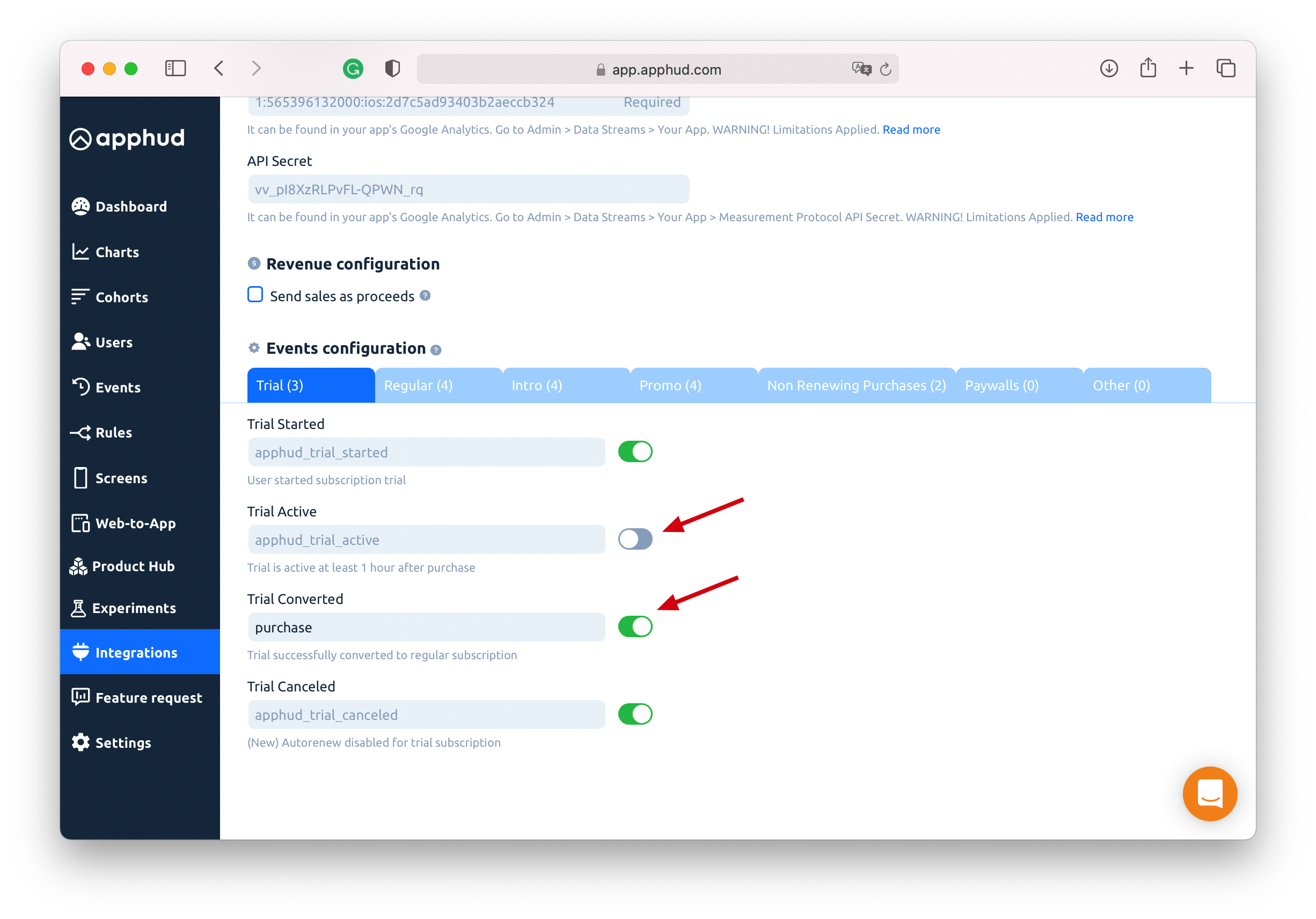
Step 8
Enable integration and click Save:
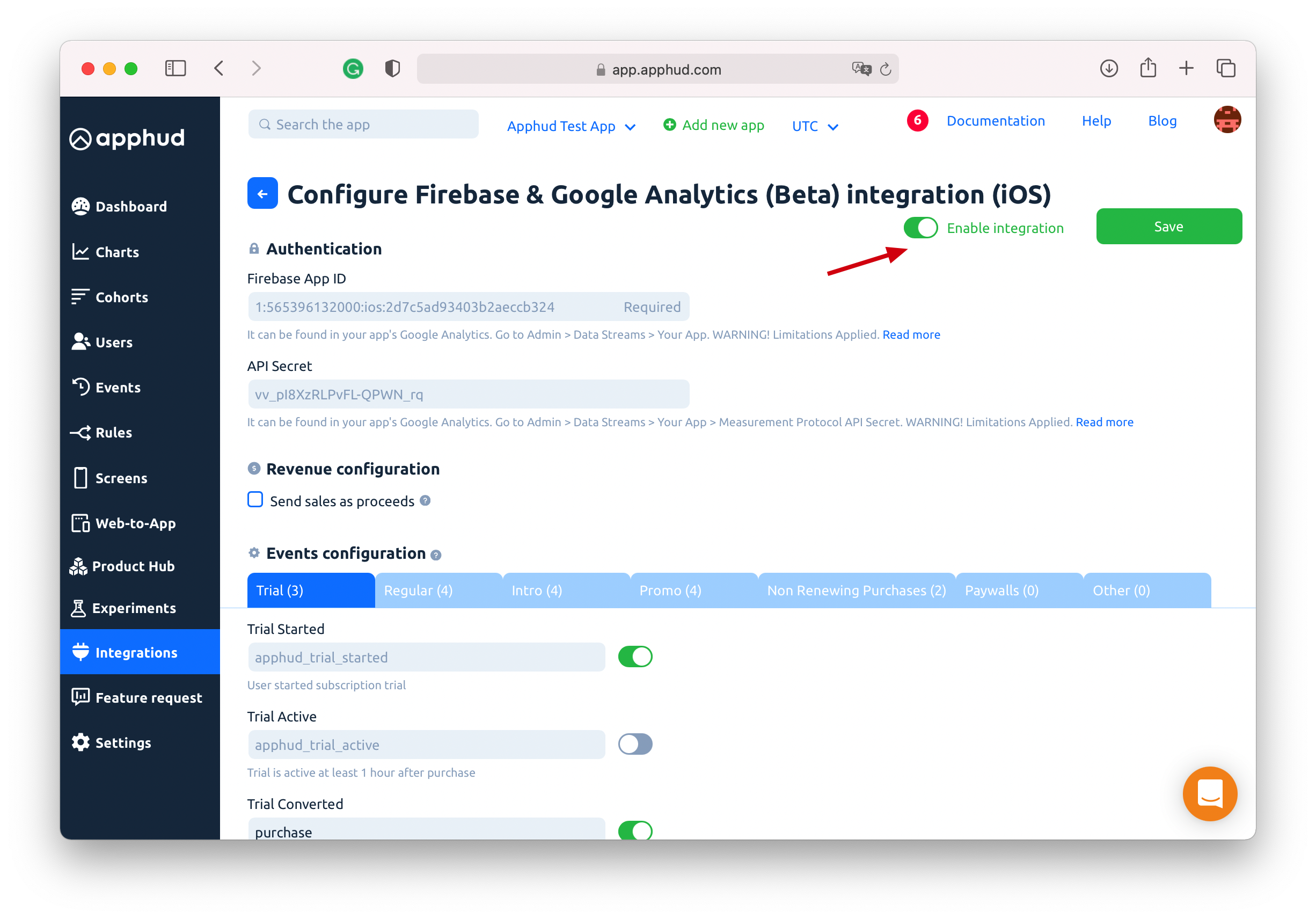
[Required] Match Users
To correctly collect events sent from both Firebase SDK and Apphud server, you need to match User IDs between Apphud and Firebase.
For every app launch call:
Analytics.setUserID(Apphud.userID())
if let instanceID = Analytics.appInstanceID() {
Apphud.setAttribution(data: nil, from: .firebase, identifer: instanceID, callback: nil)
} else {
// app instance id is nil, unable to match user
}FirebaseAnalytics.getInstance(this).setUserId(Apphud.userId())
FirebaseAnalytics.getInstance(this).appInstanceId.addOnSuccessListener { instanceID ->
Apphud.setAttribution(ApphudAttributionProvider.firebase, null, instanceID)
}.addOnFailureListener {
// Optional - Show some error
}.addOnCanceledListener {
//Optional - Show some error
}Future<void> _initFirebase() async {
final userId = await Apphud.userID();
await FirebaseAnalytics.instance.setUserId(id: userId);
final identifier = await FirebaseAnalytics.instance.appInstanceId;
await Apphud.setAttribution(provider: ApphudAttributionProvider.firebase, identifier: identifier);
}More information about User ID matching can be found here.
Import Conversions to Google Ads
Follow these steps:
- Open your Google Ads account and go to Goals > New Conversion Action.
- Select Import from Google Analytics.
- Select Google Analytics 4 properties.
- Select App (Firebase)
- Click Continue.
- Select conversion action from the list and save.
- Now your events will show up in Google Ads.
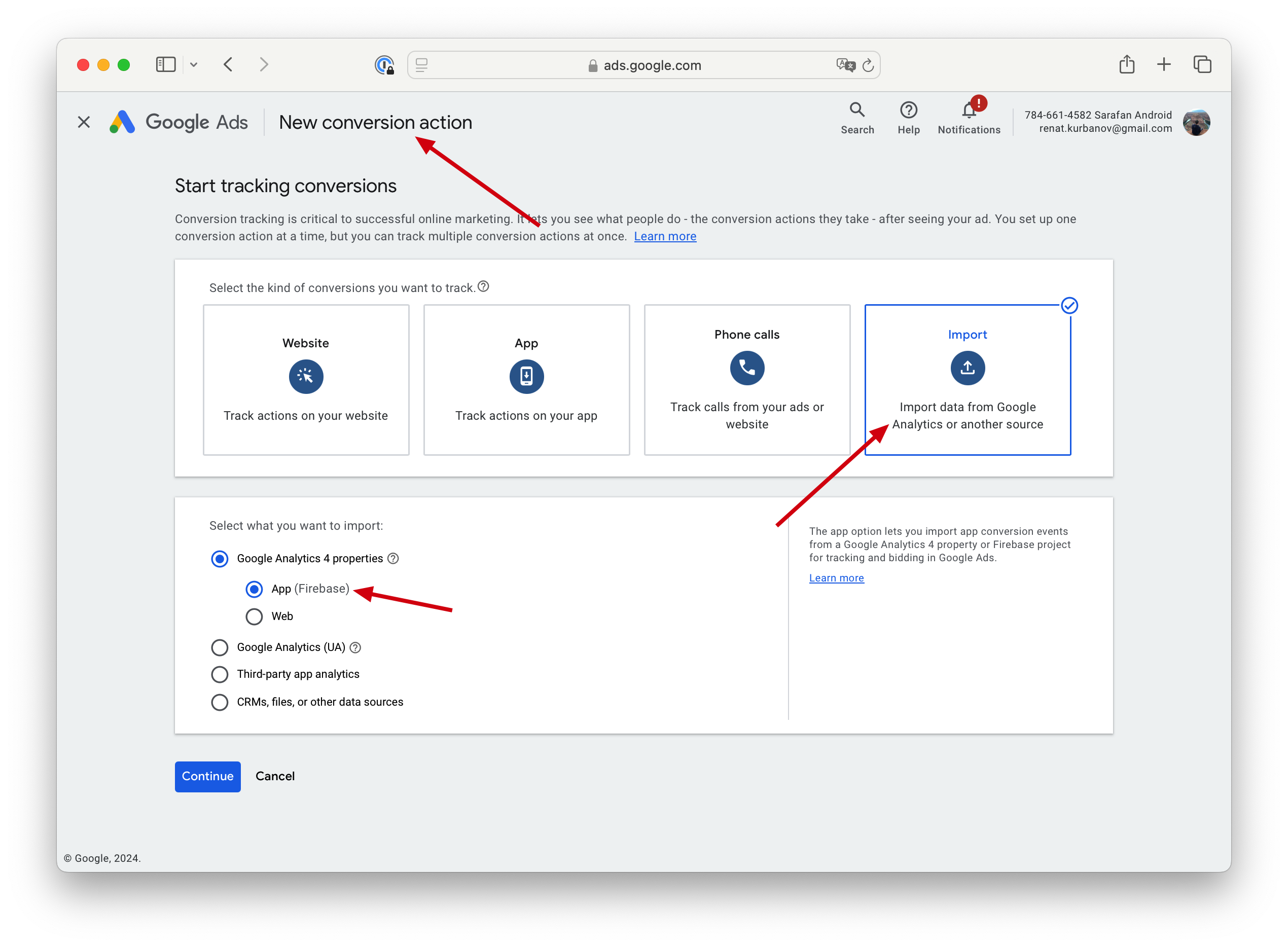
Missing Conversion Event?If you don't see desired conversion event, check the following:
- Check if your event mapping is one of the standard events list. Note that free trial event doesn't have currency and value parameters, and subscription renewal events must have currency and value.
- Ask for users tracking permission (Collect IDFA) in your app.
- Collect more events.
- Ensure Firebase is linked with Google Analytics and Google Ads
Link Firebase with Google Analytics and Google Ads
In Firebase open Project Settings > Integrations and set up Google Analytics and optionally Google Ads integrations.
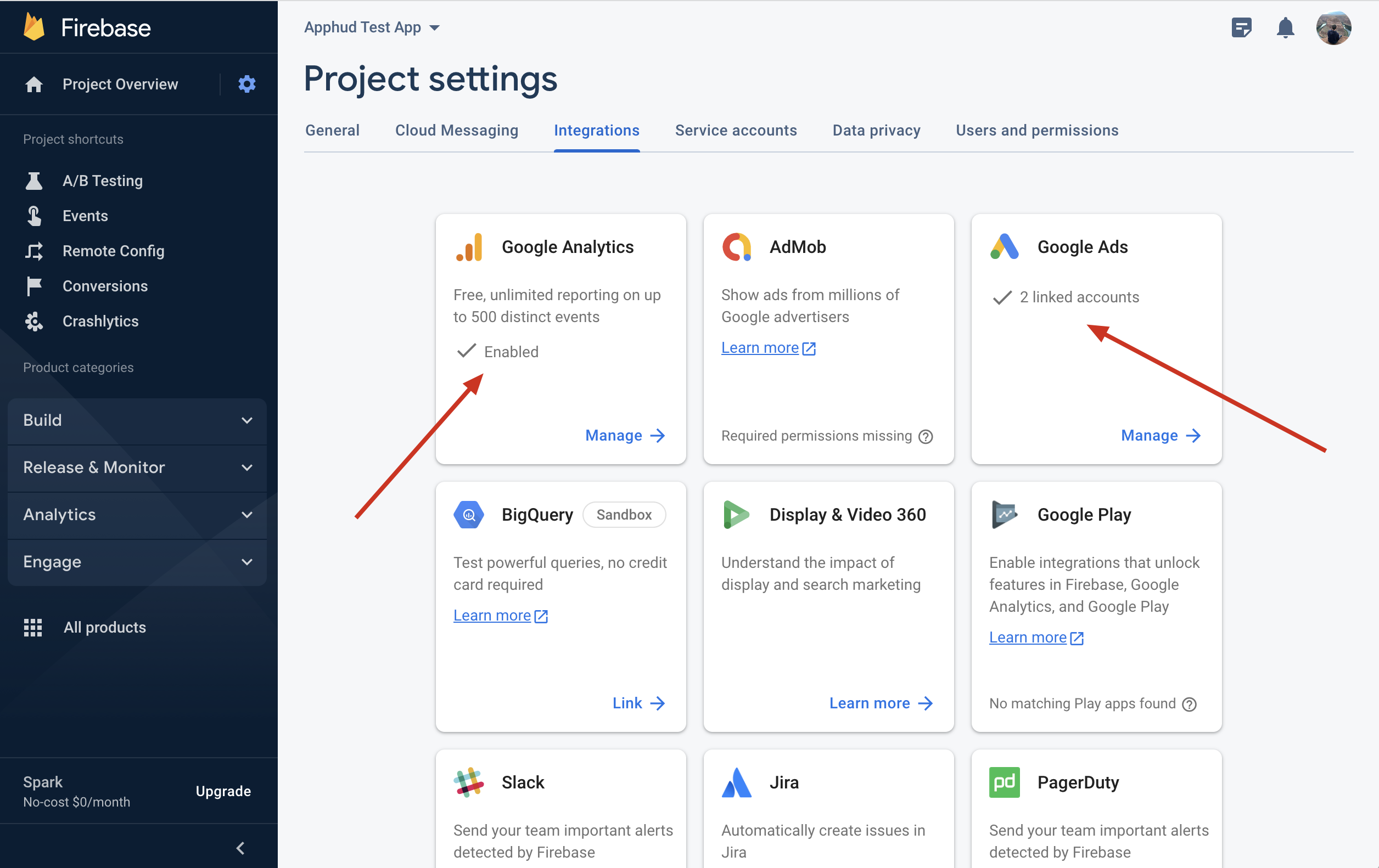
Events Mapping
Google Analytics accepts any event names, however Google Ads accepts only Standard Google Events.
When customizing event names, you may opt to replace the purchase event with another standard event listed in Google's event reference guide. It's essential to ensure that any revenue-related events in Apphud are mapped only to those standard Google Analytics events which require currency and value parameters.
However, attempting to map non-revenue events from Apphud, such as apphud_trial_started, to revenue events in Google Analytics, like purchase, will result in errors. This mismatch occurs because apphud_trial_started does not include the currency and value parameters, which are mandatory for the purchase event in Google Analytics.
If you wish to rename events like apphud_trial_started, you should select non-revenue standard events from Google Analytics that do not require specific parameters, such as tutorial_begin.
Alternatively, you can enable the "Add Value to Free Trial Events" option in the Revenue configuration section of the integration. When checked, it assigns a subscription value to free trial events, helping improve optimization:
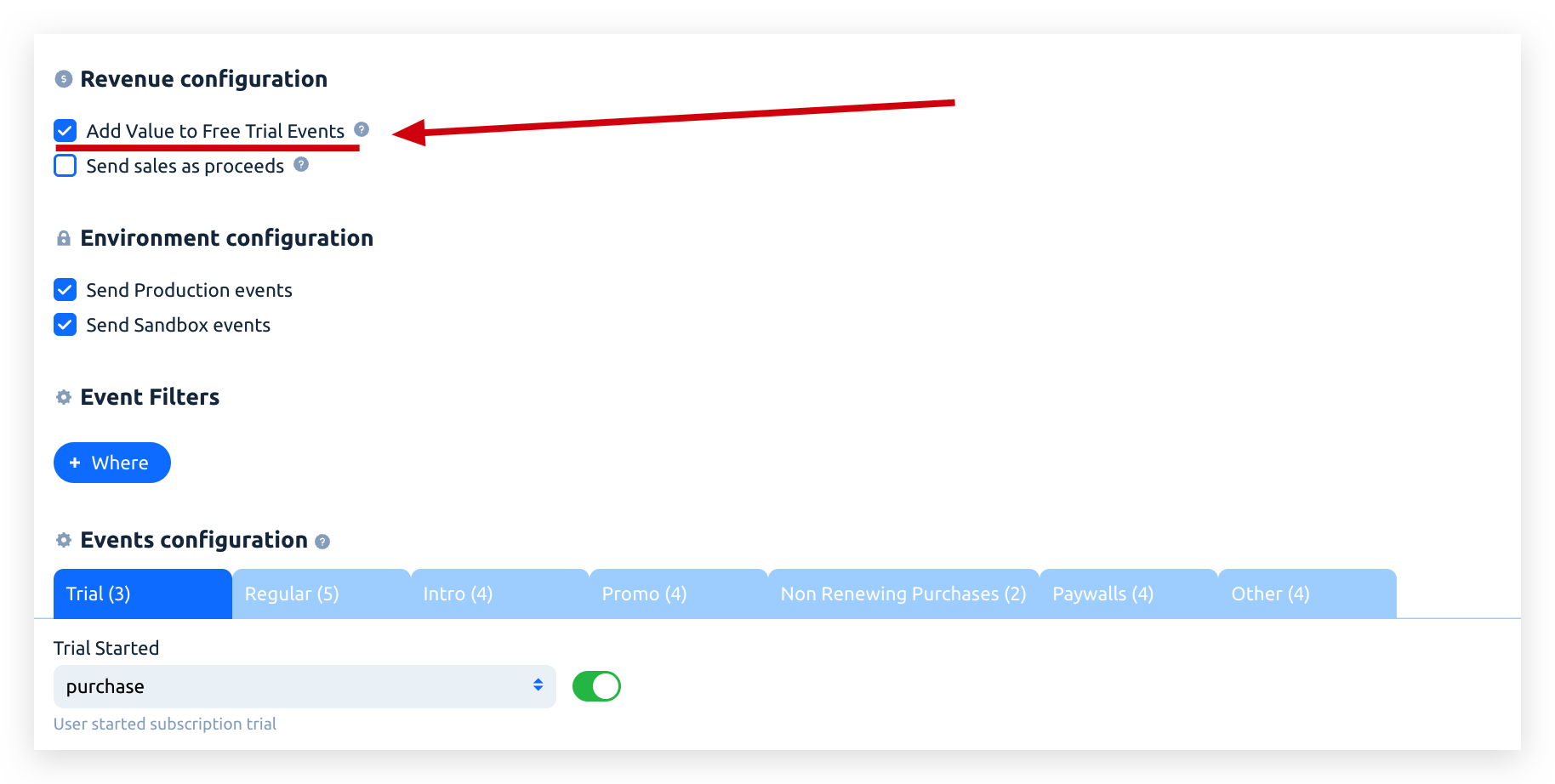
Altering event mappings without a clear understanding of the implications can lead to data inaccuracies and integration issues. If you are considering any adjustments to event names or mappings, we recommend consulting with our support team first.
Default Events Mapping
| Apphud Event Name | Firebase Event Name |
|---|---|
| Trial Started | apphud_trial_started |
| Trial Converted, Subscription Started, Subscription Renewed and other revenue events. | purchase |
| Trial Canceled, Subscription Canceled, Paywall Checkout Initiated, etc. | apphud_trial_canceled, apphud_subscription_canceled, apphud_paywall_checkount_initiated, etc. |
| Subscription Refunded | refund |
Using Google Ads Integration for Web-to-App and Web-to-Web
Temporary LimitationGoogle Web-to-App integration is temporarily unavailable. Currently, Google does not provide sufficient attribution data required for reliable user matching between web and app environments.
As a result, this functionality has been disabled until data consistency can be ensured. We will restore support if and when Google provides the necessary matching signals.
Setting up the Google Ads Integration for web-to-web and web-to-app is similar to the process for app integration, utilizing the same iOS or Android integration depending on the device platform.
-
Select the Appropriate Platform
- For web campaigns targeting an iOS app, create a Google Ads integration for iOS.
- For Android campaigns, create an integration for Android.
- If you already have an existing Google Ads integration, no additional action is required.
-
Enable Web Events
Ensure the checkbox for "Enable if the integration will also be used to attribute in-app events to web campaigns" is selected. -
Install Google Tag
Install Google Tag on your website through Framer page settings or your preferred web editor. For Web-to-App landings hosted on Apphud's domain, script code will be installed automatically. However, if you use web-to-app with your own landing, you will need to install thegtag.jsscript code. -
Ensure auto-tagging feature is on in your Google Ads account settings. Learn more.
The Apphud Web SDK will automatically capture Google Click ID parameter (e.g., client_id ) from Google Tag and use them for sending purchase events.
How to get Measurement ID and Web API Secret
- Open your Google Analytics account, and select Admin > Data Streams > Web.
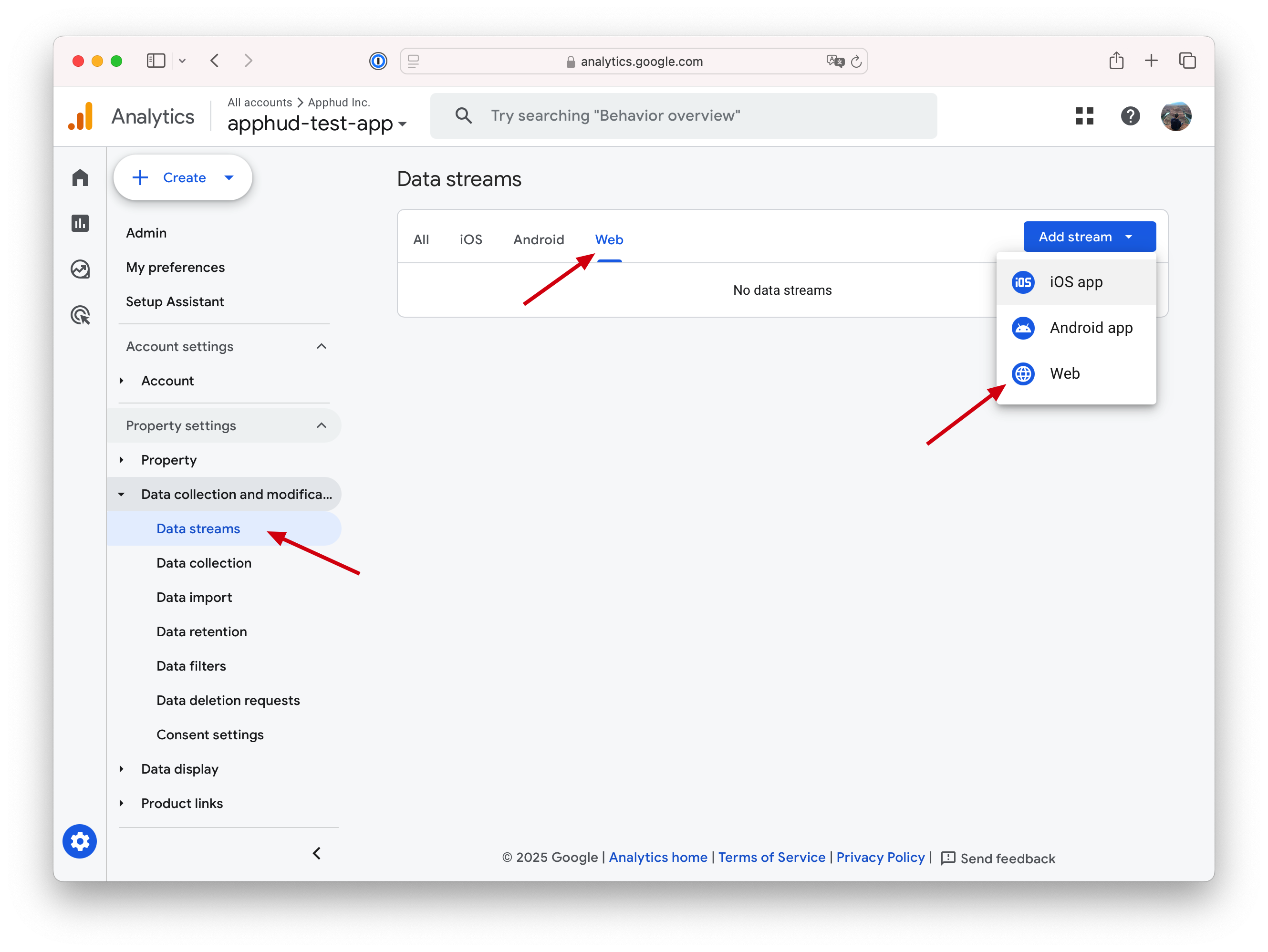
- Create your web stream and provide with production website URL (example:
myappsubdomain.siiites.comfor the Apphud Web-to-App landings,myapp.comfor your own domains, etc.). Learn more..
There you will find your Measurement ID. - Go to Measurement Protocol API Secrets and create your secret.
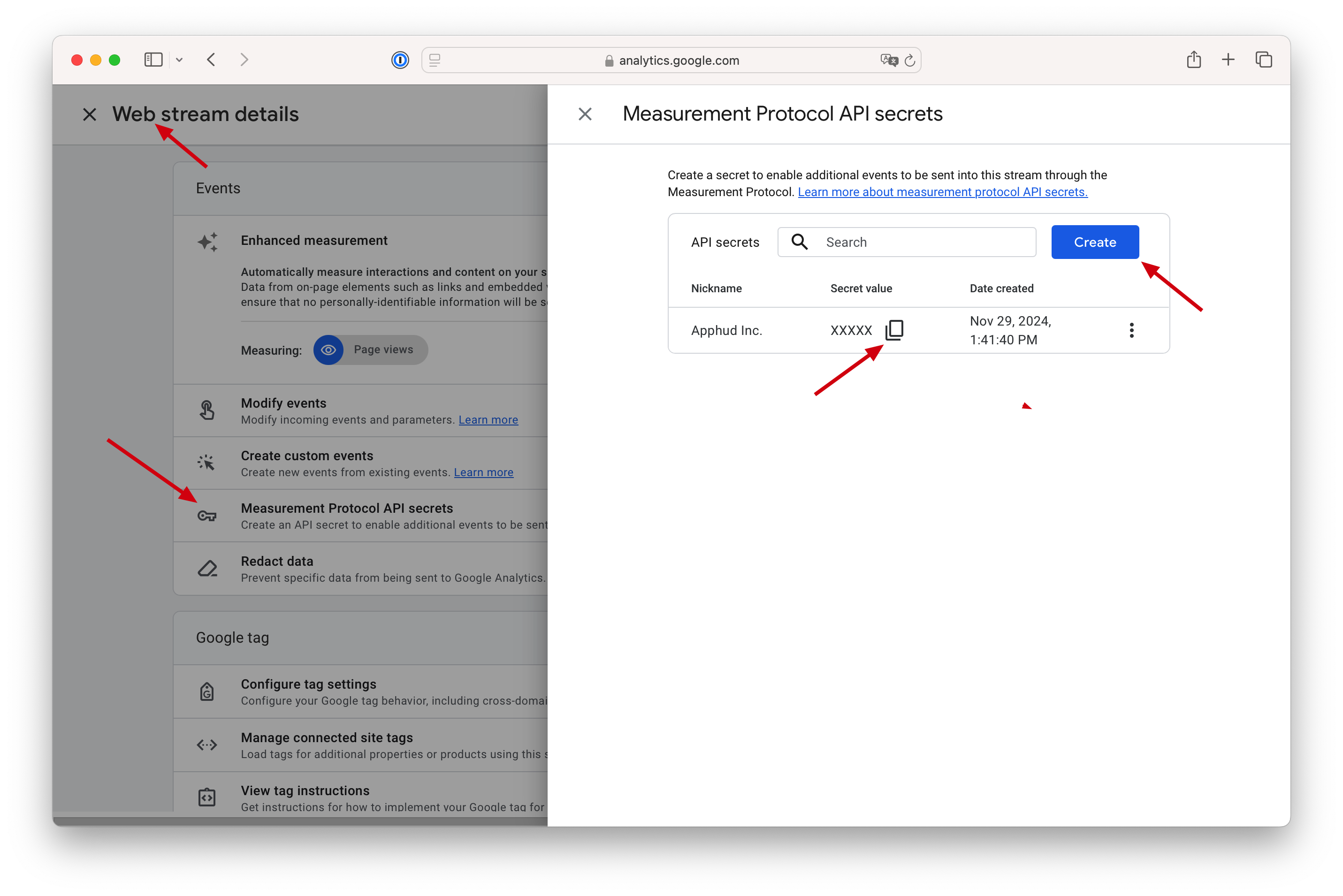
- Paste and save both Measurement ID and Web API Secret values in Apphud integration settings.
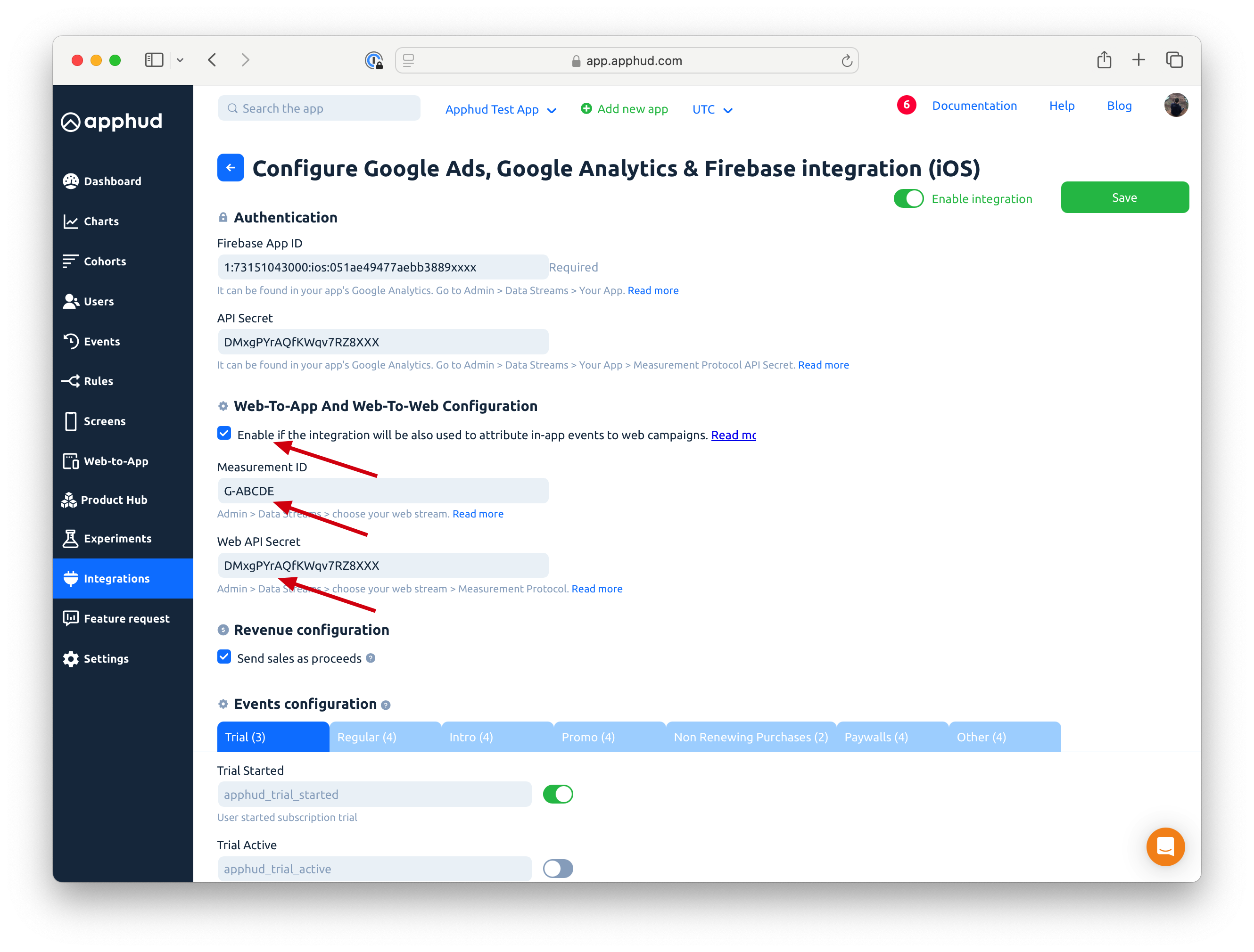
How to create Google Ads Conversions based on Google Analytics events
Before you begin, ensure that Apphud events are mapped to one of the Google standard events. Subscription revenue events must be mapped to a standard event that includes currency and value as required parameters.
Step 1: Start Creating a New Conversion Action
- Navigate to Goals > Summary in your Google Ads account.
- Click the Create Conversion Action to start the conversion action creation wizard.
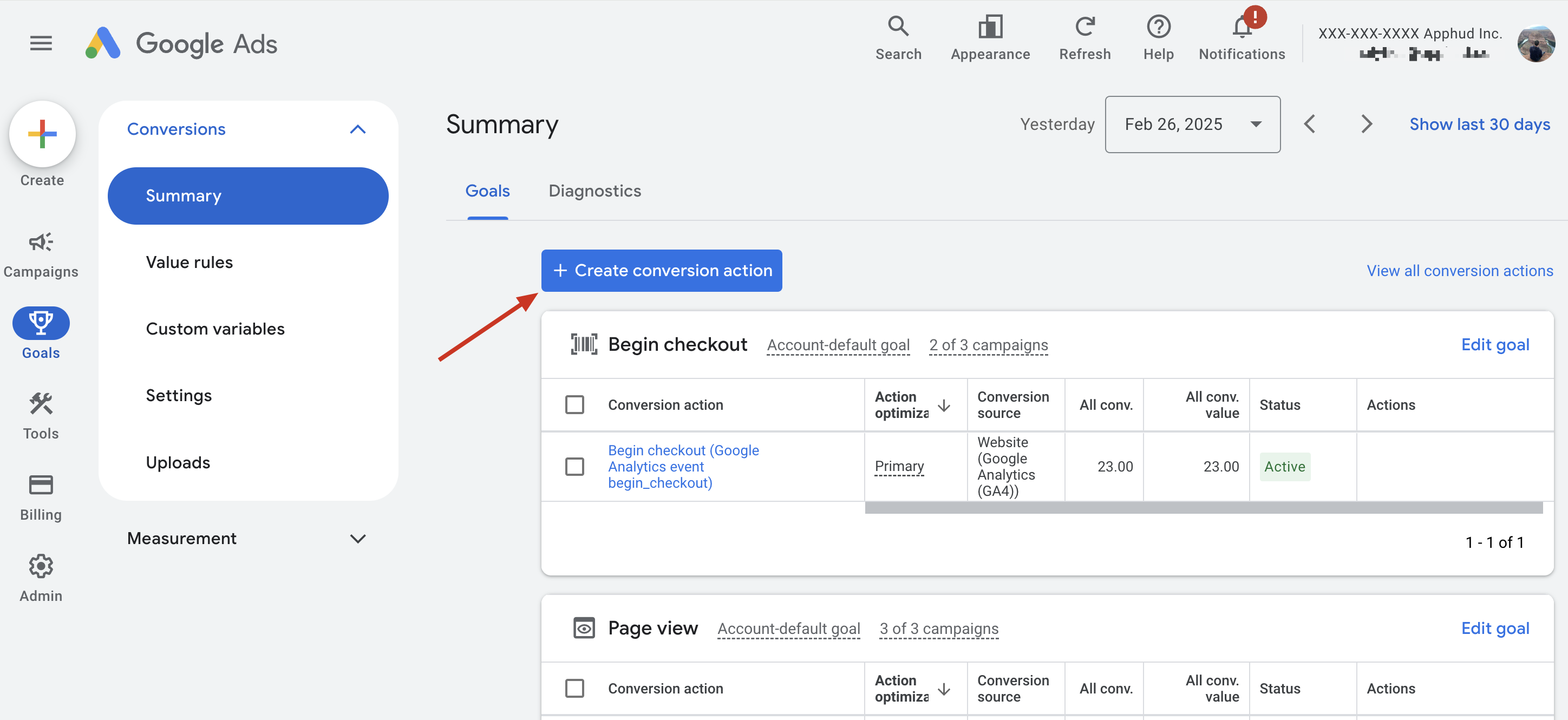
Step 2: Select Conversion Sources
- If you are tracking conversions for an app, select "Conversions on an app".
- For Web-to-App and Web-to-Web campaigns, select "Conversions on a website".
- In both cases, make sure to choose the Google Analytics property (not the Google Tag!).
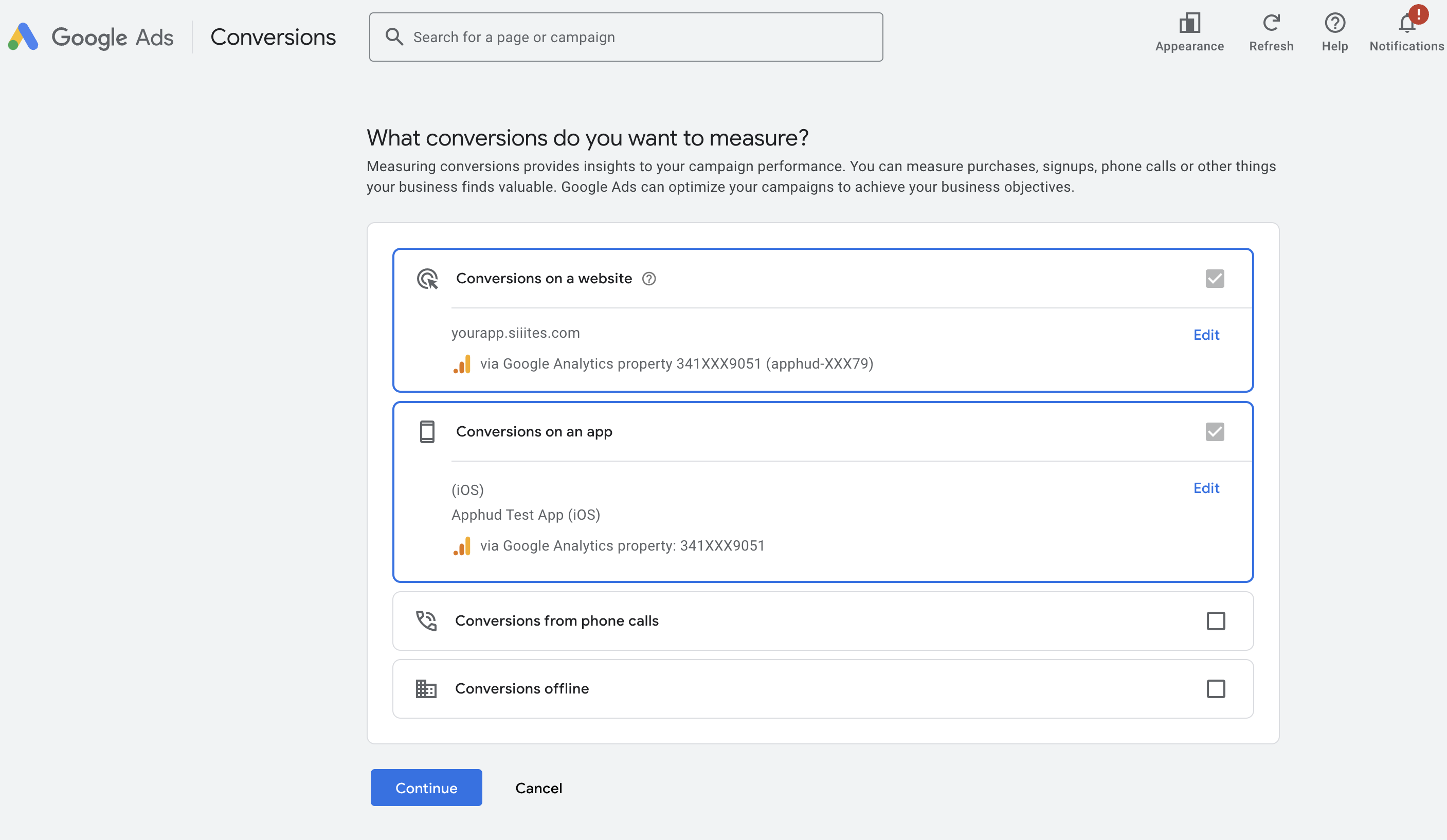
Click Continue to proceed.
Step 3: Select the Key Event
On the next screen:
- Choose the event you want to track as a conversion.
- For example, select "Begin Checkout" if you are tracking checkout initiations.
- Click on "Save and continue" button.
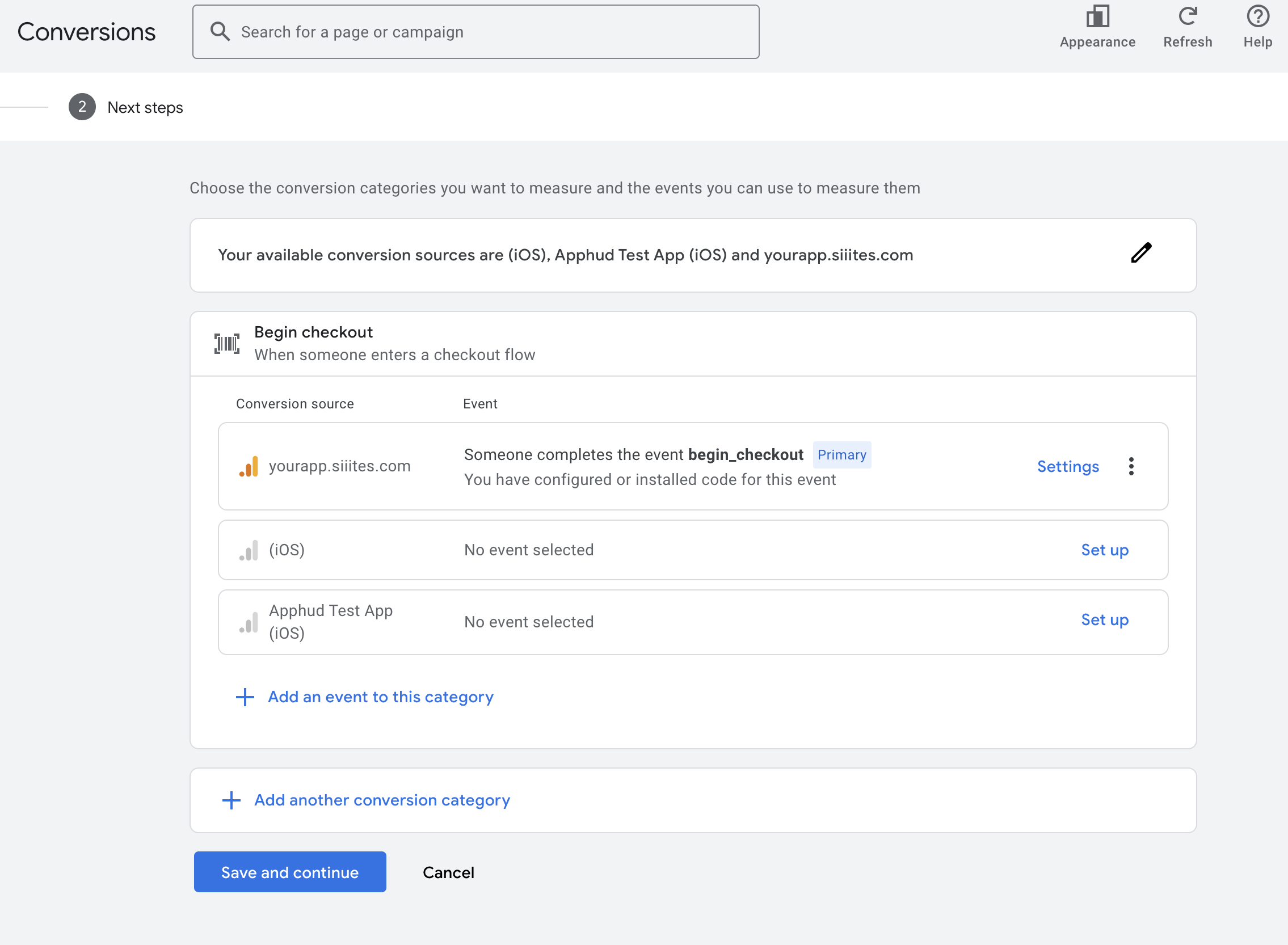
Step 4: Start Your Google Ads Campaign
That's it! Your Google Ads conversion tracking is now set up.
Once you start driving traffic, you will see conversion values appear in your Google Ads reports.
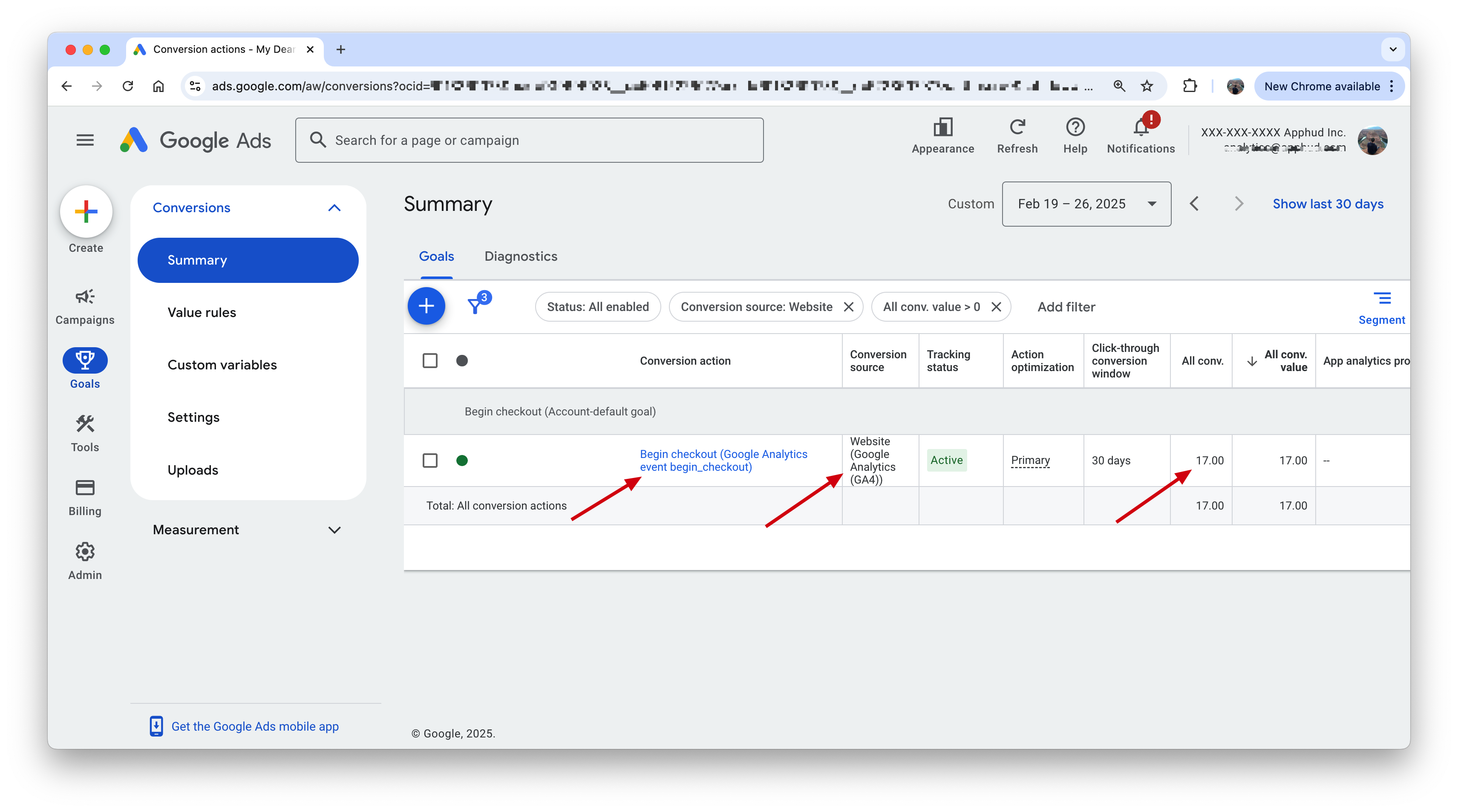
You can refer to the official Google guide for more information.
User Properties
NoteYou must have at least one event to be successfully sent to Firebase. When event is processed by Firebase, User Properties will appear in desired selection. Keep in mind that events are being processed in Firebase & Google Analytics within a few hours (usually 3-6 hours).
Besides events, Apphud also sends User Properties to Firebase. This helps you to create custom audiences or Custom Definitions and target specific users in A/B tests or view analytics for specific audience. The list of User Properties and its values can be found here.
Custom Dimensions
In order to use User Properties in your analytics you should first assign them to a custom dimension.
- Open your Firebase Console > Custom Definitions > Create custom dimensions.
- While creating custom dimensions select User scope.
- Enter name and description.
- Select User Property, for example,
apphud_payments_count. Click Save.
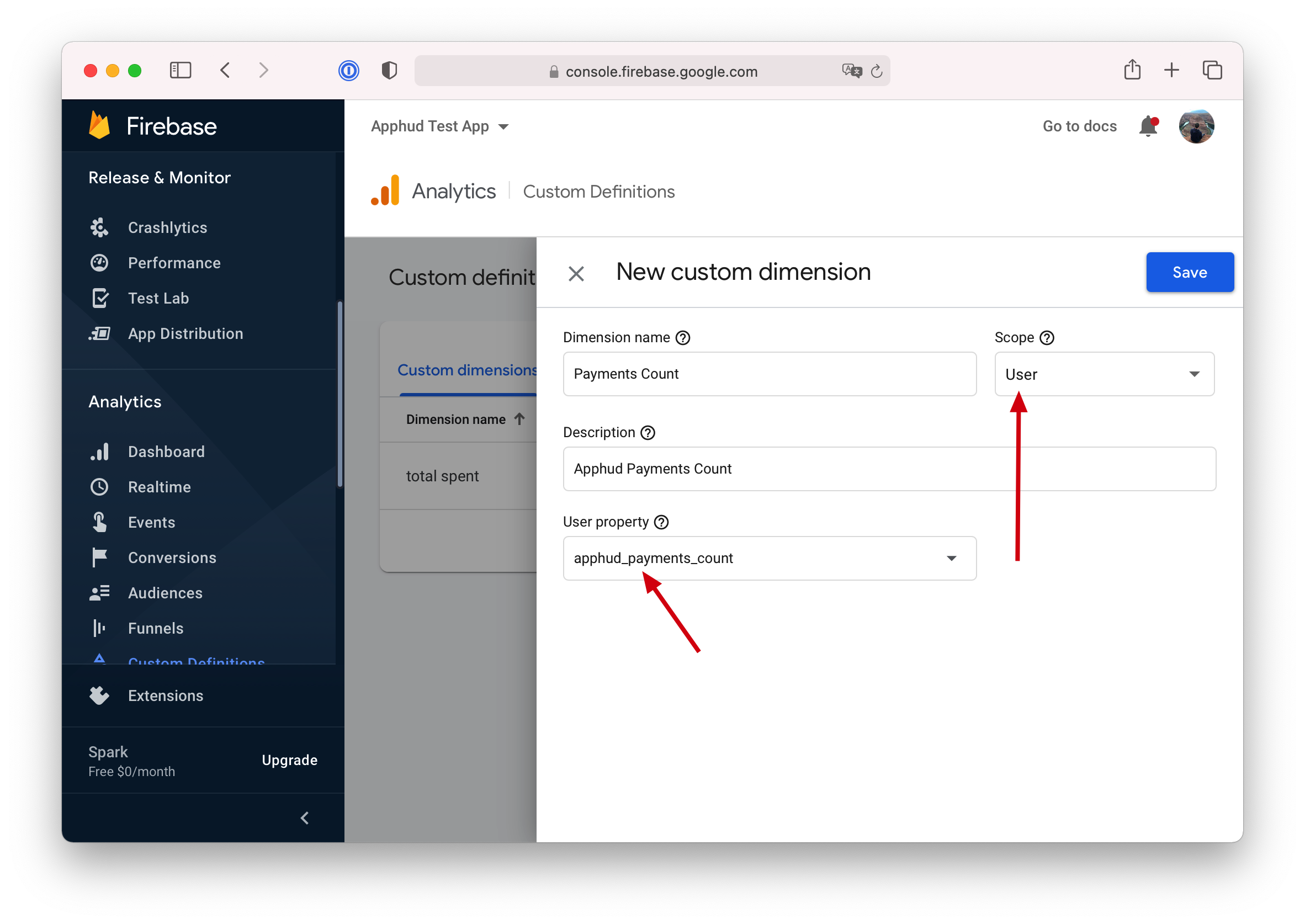
Custom Audiences
NoteIn order to create custom audience using Apphud User Property you should first create Custom Dimension. See instructions above.
After creating a custom dimension, you can create custom audiences.
- Open your Firebase Console > Audiences > Create custom dimensions.
- Select Custom > your custom dimension name, for example,
apphud_total_spent - Edit condition on this property, for example,
> 0. Click Save. - Custom Audience is now available in both Firebase and Google Analytics.
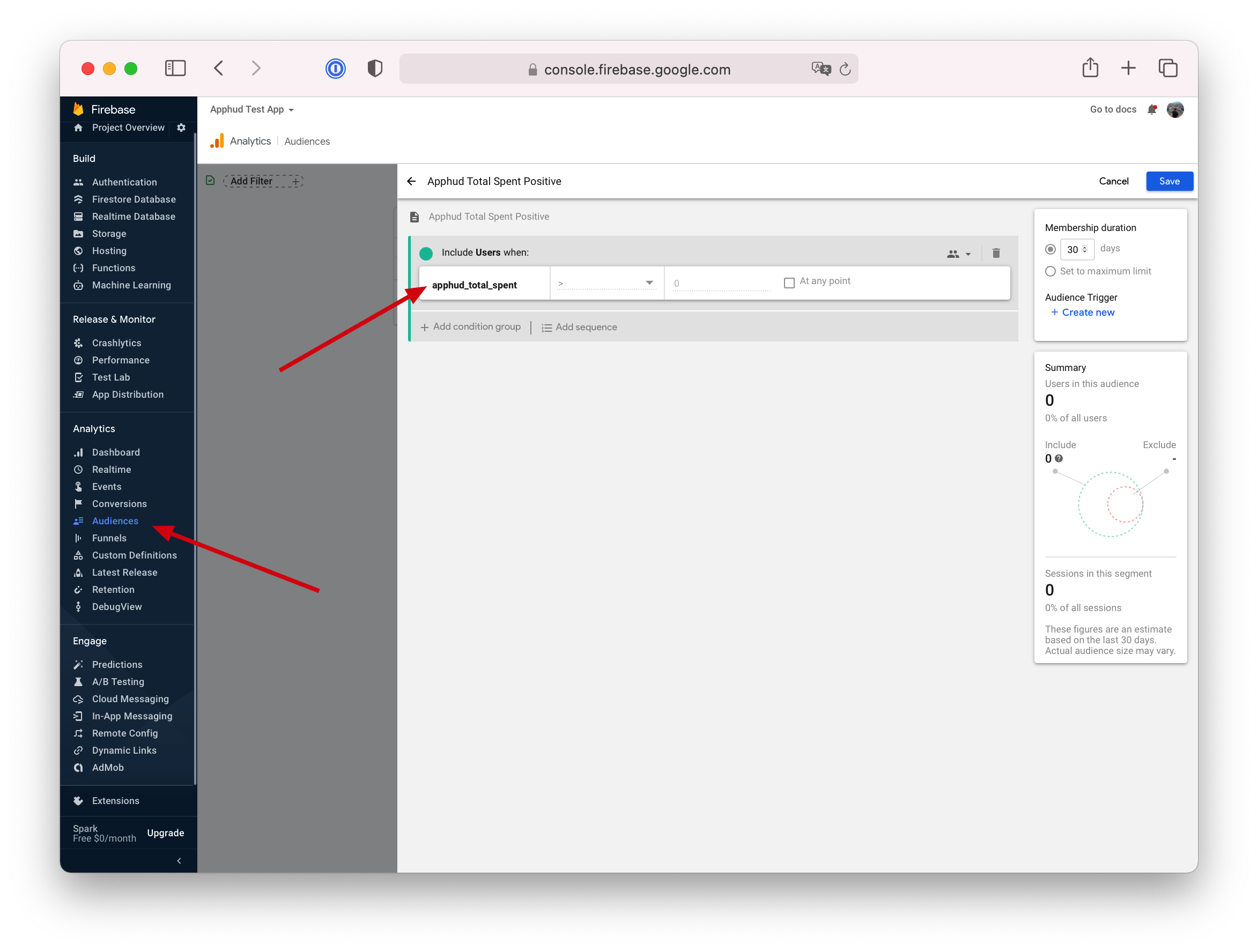
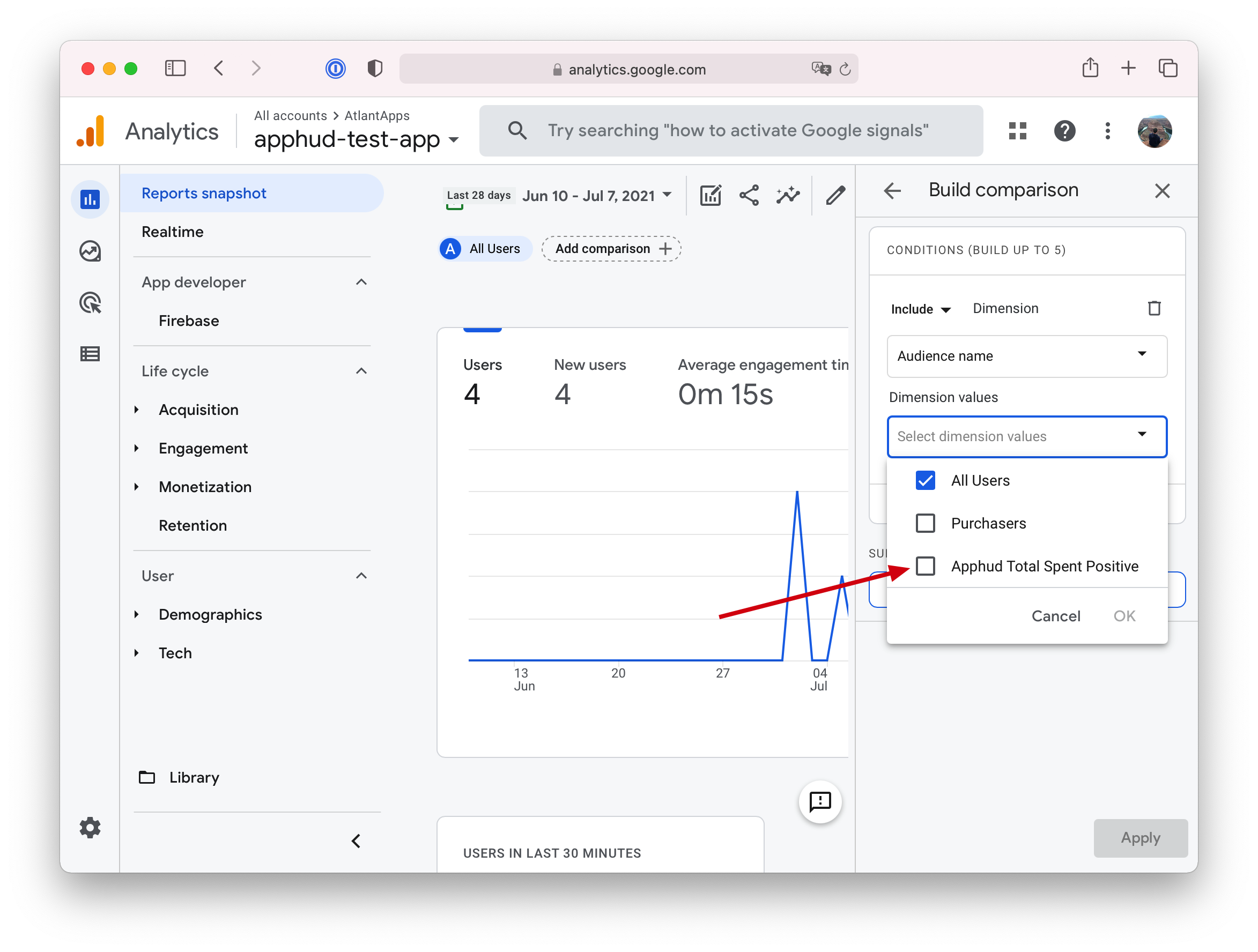
View Firebase A/B test results in Apphud
You can view results of A/B tests in Apphud by sending remote config values to our service. You will be able to add filter of your test variant for every chart including cohort chart.
See this great blog post for details.
Updated 6 days ago
